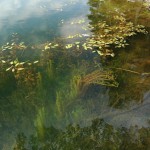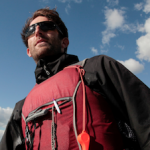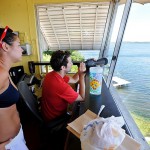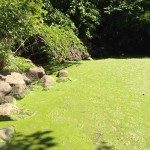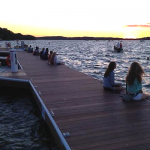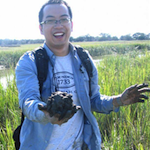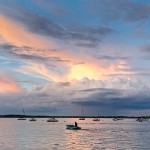Tag Water
Water systems research fills in the details for Africa’s largest dam
When the government of Ethiopia finishes building the Grand Ethiopian Renaissance Dam (GERD) in 2017 or 2018, it will not only have built the largest hydroelectric power-generation plant in Africa, but also stirred up tensions among African nations, and indelibly altered a river that itself has guided millennia of human history in the region.
Connection found between nitrogen levels in water and toxic algae production
Scientists have long known that phosphorus fuels growth of algae in lakes and streams. Wisconsin Sea Grant researchers have found that nitrogen levels are a factor in whether or not these algae – specifically, blue-green algae –produce toxins. The findings, published in PLOS ONE have parts of the scientific community buzzing.
Study challenges prevailing view of invasive species
Zebra mussels. Asian carp. Kudzu. Chances are you recognize these names as belonging to invasive species - plants or animals that are relocated from their native habitat to a foreign land, only to prove so prolific that they take over their new home. Except that's not how the story usually goes, according to a new study.
Scientists find early warning indicators of major ecological change
Day after day, the buoy bobbed at the surface of Peter Lake. Every five minutes, or 288 times a day, instruments in the water silently recorded samples without creating so much as a ripple. But, beneath the surface, the lake - just across Wisconsin's northern boundary in Michigan's Upper Peninsula - was in turmoil. The buoy was busy documenting massive change.
UW Sailing: Against the odds, this club sport makes waves
Unlike most collegiate sailing teams, the UW–Madison Sailing Team has to deal with eighty-plus days of Lake Mendota ice — but the team doesn’t let a little bad weather hold them back.
Remembering John Vietnam: Honoring a fallen friend, artist, activist
On the morning of August 30, 2012 John Vietnam tragically drowned in Lake Mendota, but his work lives on. Madison Mayor Paul Soglin has taken part in memorializing his legacy and declared August 30th as John Vietnam Nguyễn Day in Madison.
Lifesaving station issues lake safety reminder
With the tragic drowning of a student in Lake Mendota last week, the UW Lifesaving Station is reminding people of the lake’s potential dangers and encouraging all of those enjoying the water to use caution.
Storm water treatment will strip phosphorus from Arboretum pond
The UW Arboretum’s Marion Dunn Pond will soon be home to a pilot project aimed at snatching the phosphorus and sediment from storm water before it surges into the wetlands around Lake Wingra.
Ecologists map the benefits of our ecosystems
Two ecologists at the University of Wisconsin–Madison report this week (July 1) in the Proceedings of the National Academy of Sciences a novel approach to analyzing the production and location of 10 different ecosystem services across a landscape, opening the door to being able to identify factors governing their synergies and tradeoffs.
New signs to encourage lake safety
New signs have been installed along the Lake Mendota shoreline on the UW–Madison campus in an effort to draw more attention to lake safety.
Lake Mendota still officially open water
This is the time of year Lyle Anderson, office manager at the Wisconsin State Climatologists Office, “has a pair of binoculars pinned to his head ’round the clock,” according to John Young, state climatologist and emeritus atmospheric sciences professor.
Stirred, not shaken, lake mixing experiment shows promise
The question is simple: can a lake be cleansed of a pernicious invader by simply raising the water temperature?
Bodies of Wonder
Madison wouldn’t be Madison without its five nearby lakes that offer an abundance of choices — from quiet locations for contemplation to vast playgrounds during…
Lake algae: What you don’t see can really hurt you
The strikingly blue algae that afflicted the Madison lakes last week hardly needs a danger sign to warn of its toxicity.
Artists, scientists collaborate on exhibit focusing on ecological change
In the popular imagination, the thought processes of artists and scientists could hardly be more distinct. And yet a year-long collaboration of lake scientists and artists from northern Wisconsin has engaged both sides of the "divide" in understanding and communicating the changing ecology in one of the world's densest group of lakes - in the northern highlands of Wisconsin.
Water, water everywhere focus of new sustainability project
An interdisciplinary team of scientists and engineers at the University of Wisconsin–Madison is turning a comprehensive lens on Madison's water in all its forms - in the lakes, streets, faucets, ground and atmosphere - thanks to the National Science Foundation.
Long-term lake study suggests ecological mechanism may control destructive crayfish
Just a few years ago, scientists at the University of Wisconsin–Madison's research station in Boulder Junction, Wis., were growing sick of a crustacean delicacy - the rusty crayfish. Roughly 90,000 of the animals had been caught during an intensive trapping program at the nearby Sparkling Lake.
Global grassroots lake science network has roots in Wisconsin
Inspired and led by freshwater scientists at the University of Wisconsin–Madison, researchers eager to understand global ecosystems from end to end are now monitoring a series of buoys in lakes on every continent except Africa. Each buoy carries instruments to measure fundamental data on the weather above the water and the temperature and chemistry below it.
Confronting toxic blue-green algae in Madison lakes
Harmful algal blooms, once considered mainly a problem in salt water, have been appearing with increasing severity in the Madison lakes, and a team of University of Wisconsin–Madison researchers has geared up to understand the when, where and why of these dangerous "blooms."


